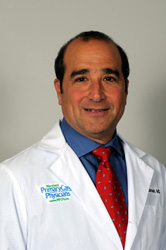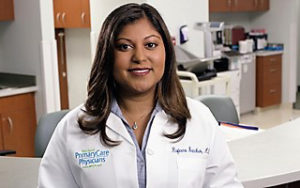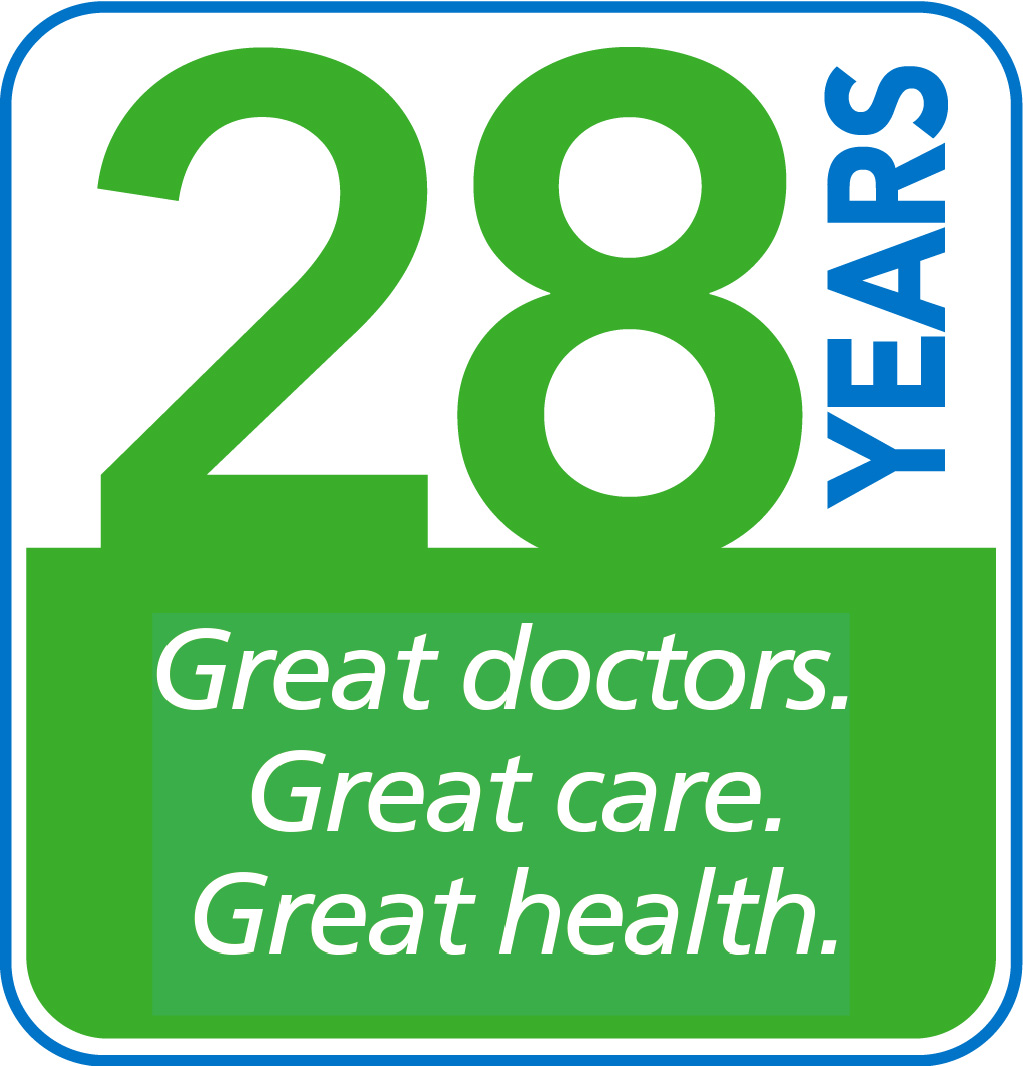Tag Archives: general-and-family-care
Board Certified for Better Care
By: Michael Riebman, MD and MPCP President
If you look at the online profiles of our doctors, you’ll see they are “board certified” in Family Medicine, Internal Medicine, or Cardiology. This is an important distinction for physicians, and it gives you additional assurance that you and your family are receiving the best possible care.
A little background: To practice medicine, doctors must undergo years of rigorous training, including a premedical college degree, a degree from a medical school, and up to five years of full-time experience in a residency training program of their chosen specialty. Only after completing all these requirements are they able to practice medicine in the community.
Once they complete their specialty residency program, physicians can demonstrate extra expertise in their chosen medical specialty by earning a certification through one of the 24 accrediting organizations belonging to the American Board of Medical Specialties. Certification means a doctor has acquired the extra knowledge and experience to practice a medical specialty, such as Family Medicine, Internal Medicine, or Cardiology.
Doctors earn this board certification by passing an examination administered by the member board in their specialty. The exams assess medical knowledge and clinical judgment, and include real-life situations that demonstrate a physician’s knowledge of the latest medical practices.
Medical boards issue time-limited certifications. Their certifications last for up to 10 years, but doctors have to complete additional work between these re-certifications, known as continuing medical education, such as reviewing their performance on patient care and self-assessing their knowledge of new medical developments.
In short, the re-certification program provides doctors a structured approach to improving the effectiveness of their performance in treating patients. It also assures patients that their doctors remain experts in their fields.
MPCP requires all of our doctors to be board certified. This gives our patients the added assurance they’re getting the highest level of care, and that our physicians are committed to keeping their skills sharp and up to date.
 Dr. Riebman is certified by the American Board of Family Medicine and is the current president of Maryland Primary Care Physicians. He sees patients in MPCP’s Annapolis office.
Dr. Riebman is certified by the American Board of Family Medicine and is the current president of Maryland Primary Care Physicians. He sees patients in MPCP’s Annapolis office.
Why You Need a Checkup (Even If You Feel Fine)
By: Manuel Skow, P.A.
If you feel okay, you don’t need to see the doctor, right?
Wrong. An annual checkup with your primary care doctor should be part of your regular health routine, just like exercise. Here are five good reasons to schedule a checkup, even if you feel fine.
1. Staying healthy
Keeping up to date with vaccinations and screenings is basic to good health. Vaccinations can prevent some serious diseases, such as measles, polio, diphtheria, whooping cough, German measles, mumps, tetanus, rotavirus, the flu and even cervical cancer. And screening tests are done to detect potential diseases in people who do not have any symptoms, leading to the early identification of serious conditions such as high blood pressure, high cholesterol, diabetes and cancer. Early detection is important because it provides the best opportunity for a cure.
2. Knowing your numbers
Do you know your numbers? They include:
- Blood pressure
- Cholesterol level
- Blood sugar level
- Body mass index
High blood pressure and blood sugar, and unhealthy weight and cholesterol, greatly increase your risk for heart attacks, strokes and kidney disease. Also, if you have prediabetes or diabetes, you must carefully monitor your number to control the disease and improve the quality of your health.
Your doctor can help you learn your numbers and take steps to keep them in a healthy range.
3. Creating a medical record
Annual visits to the doctor are a chance to update your personal medical record. This record helps your doctor keep tabs on your health and monitor any issues you have. Also, if you are hospitalized in an emergency, having access to your medical records can reduce unnecessary testing, prevent allergic reactions, and help you get the best care possible.
4. Building a doctor-patient relationship
This relationship doesn’t just happen. It takes several visits for your doctor to really understand you, and for you to feel comfortable with your doctor. A good relationship is important because it can affect any treatment you receive, such as whether you can take certain medications.
5. Low-cost prevention
Most health insurance covers an annual checkup, including lab tests. There may be a small co-pay, but this is usually minimal. For one low fee, your doctor can assess your health, discuss your needs and concerns, and help you head off potentially serious health issues.
Has it been more than a year since your last checkup? Call your MPCP office today to set one up and get started on your healthier future.
 Manuel Skow, Physician Assistant, received his Master of Science/Physician Assistant degree from St. Francis University, and completed his Physician Assistant Preceptorships in Primary Care at the U. S. Naval Academy Brigade Clinic and Internal Medicine/Cardiology at the Walter Reed Army Medical Center. He sees patients in MPCP’s Glen Burnie office.
Manuel Skow, Physician Assistant, received his Master of Science/Physician Assistant degree from St. Francis University, and completed his Physician Assistant Preceptorships in Primary Care at the U. S. Naval Academy Brigade Clinic and Internal Medicine/Cardiology at the Walter Reed Army Medical Center. He sees patients in MPCP’s Glen Burnie office.
Making the Most of Your Doctor Visit
A Q&A with Rafeena Bacchus, M.D.
Most of the time, your primary care physician is your first contact for health care. When you make an appointment, knowing how to prepare and what to expect will help you get the most out of your visit.
Q: What kind of appointments can I get at MPCP?
A: We offer two types of appointments:
- A problem visit addresses a new problem or revisits an old one.
- A physical examination is a preventative visit to review your history, examine your body from head to toe, check appropriate blood work (like blood sugar and cholesterol), administer age-appropriate immunizations, and offer age-appropriate screening referrals (like mammograms and colonoscopies).
Making the right kind of appointment will ensure that your doctor can effectively address your health needs.
Q: Can I do anything to get ready for my appointment?
A: There are several steps you can take ahead of time to make sure your appointment runs smoothly:
- Be very clear about what you need when you make your appointment. This allows your doctor to properly prepare for your visit. For example, if you have abdominal pain, your provider can offer you a drape so you can undress from the waist down for an exam.
- Know what referrals you need.
- Take a few minutes to write down notes and questions to make sure all of your concerns get addressed.
- If your provider asked you to monitor your blood sugar or blood pressure, remember to bring those logs in with you.
- If you want to discuss tests ordered by a provider outside of MPCP, don’t assume that we have received these records, even if you asked for them to be sent. Track them down and bring them with you. If you need help tracking down records, call your provider’s assistant a day or two prior to your appointment to alert MPCP to this request.
Asking for copies of test results when you are seen elsewhere is always a good idea. It facilitates your bringing them to your provider for discussion and helps eliminate duplicate testing. Feel free to ask for the records and test results – they belong to you.
Q: When should I arrive for my MPCP appointment?
A: Come 10-15 minutes early to complete paperwork, use the bathroom and gather your thoughts. Turn off your cellphone. This will ensure your entire appointment is used for face-to-face time with your doctor.
Q: How long will my appointment last?
A: Appointment lengths vary from 10 minutes for simple problems to 30 minutes for physical examinations or complex problems.
While your provider would like to be able to address every concern you have, this may not be possible due to time limits. You may need more than one visit or visit type to address all of your concerns.
Q: Sometimes my visit is delayed. Why is that?
A. The most common reasons your doctor might be running late for your appointment are patient tardiness, complicated problems and emergencies. Feel free to ask the check-in staff if your provider is running on time.
Q. What does my doctor need to know about my medications?
A: Your doctor will need to know 1) what medications you take, 2) why you take them, 3) the dose for each one, and 4) how often you take them. We encourage all patients to create a list of all medications, supplements, and vitamins you take. Include any drugs a specialist or urgent care center added to your regimen. Some patients bring the actual pill bottles to avoid confusion.
Your doctor can print a list at checkout of all the active medications we are aware of you taking. Once your provider has a full picture of what you take, they can help you avoid drug-drug interactions or be alert to medication-induced illness.
Q. Is it okay to ask questions?
A. It’s your doctor’s job to make sure you understand and follow through on care, so don’t be afraid to ask questions.
If you don’t understand what your doctor tells you, say so. Repeat back what you hear to confirm you have it right. Take notes. If you still aren’t clear after you leave the appointment, call back and ask for clarification.
Q: What health records should I keep?
A. It’s a good idea to keep a folder with copies of these health records:
- Recent test results
- Your current medication list
- Your insurer’s list of covered medications
- A list of your providers with contact information
- Pending referrals
- Lists of your questions
- Blood sugar or blood pressure diaries
- Vaccine dates
Take notes at your office visits to help you remember important points about your care, and keep them in your folder so you can review them when necessary. Bring your folder on any visit to a healthcare provider, an urgent care center or hospital to help reduce gaps in your care.
Q: What happens after my appointment?
A: MPCP uses its online Patient Portal to communicate test results, or you doctor may call you. But if you don’t get test results in a timely fashion, be sure to ask for them.
Take prescribed medication as directed, and talk to your provider if you have side effects and need to make adjustments. If your doctor schedules a follow-up appointment, be sure to keep it so your doctor can check on your progress and make any needed changes to your care.
 Dr. Rafeena Bacchus sees patients at MPCP’s Columbia office. She received her medical degree from SUNY at the Buffalo School of Medicine and completed her residency program in Internal Medicine at the University of Maryland. She is certified by the American Board of Internal Medicine.
Dr. Rafeena Bacchus sees patients at MPCP’s Columbia office. She received her medical degree from SUNY at the Buffalo School of Medicine and completed her residency program in Internal Medicine at the University of Maryland. She is certified by the American Board of Internal Medicine.



